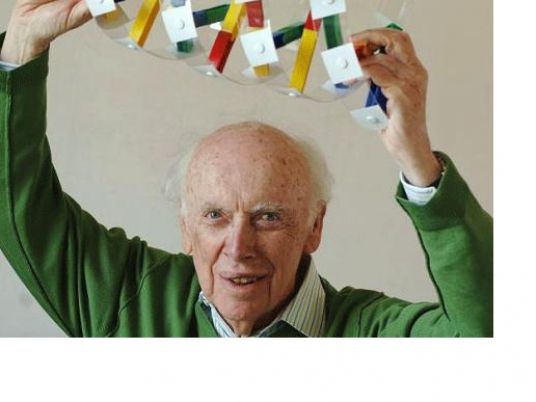
A Nobel Prize gold medal awarded to American scientist Dr. James Watson, a co-discoverer of DNA, is expected to sell for up to $3.5 million at auction next month in New York, Christie's said on Monday.
Watson, along with Francis Crick and Maurice Wilkins, unraveled the double-helix structure and function of deoxyribonucleic acid (DNA) in England in 1953 in a discovery that heralded the modern era of biology.
The medal, the first to be offered by a living recipient, will go under the hammer on Dec. 4, with a pre-sale estimate of $2.5 million to $3.5 million.
"It is recognition of probably the most significant scientific breakthrough of the 20th century and the impact of it is only being played out now in the 21st century," said Francis Wahlgren, international head of books and manuscripts at Christie's. "Whole industries have developed around it."
The scientists received the Nobel Prize for medicine in 1962 for their ground-breaking work. Watson, 86, will donate part of the proceeds from the auction to charities and to support scientific research.
In addition to the medal, Watson's handwritten notes for his acceptance speech will also be offered at the auction and are expected to fetch up to $400,000, along with his manuscript and corrected drafts for his Nobel speech, which have a pre-sale estimate of $200,000 to $300,000.
"There hasn't been any Watson scientific manuscript material ever offered at auction before," said Wahlgren.
The medal is not the first Nobel Prize to be auctioned, but it is expected to generate considerable global interest following last year's sale of Crick's letter to his son, in which he outlined the structure of DNA shortly before the discovery was published.
The letter sold for $6 million, more than three times the estimate, and set the world record for any letter sold at auction.
Crick's Nobel Prize medal fetched $2.27 million when it was auctioned last year. A 1936 Nobel Peace Prize medal sold for $1.1 million last year.
That medal was awarded to Carlos Saavedra Lamas, foreign minister of Argentina, for his part in ending the Chaco War between Paraguay and Bolivia, and for his work on a South American antiwar pact that was signed in 1933.
